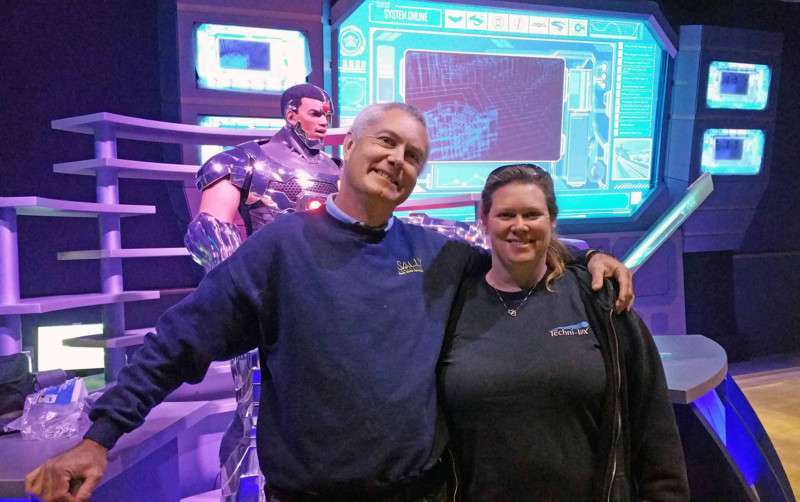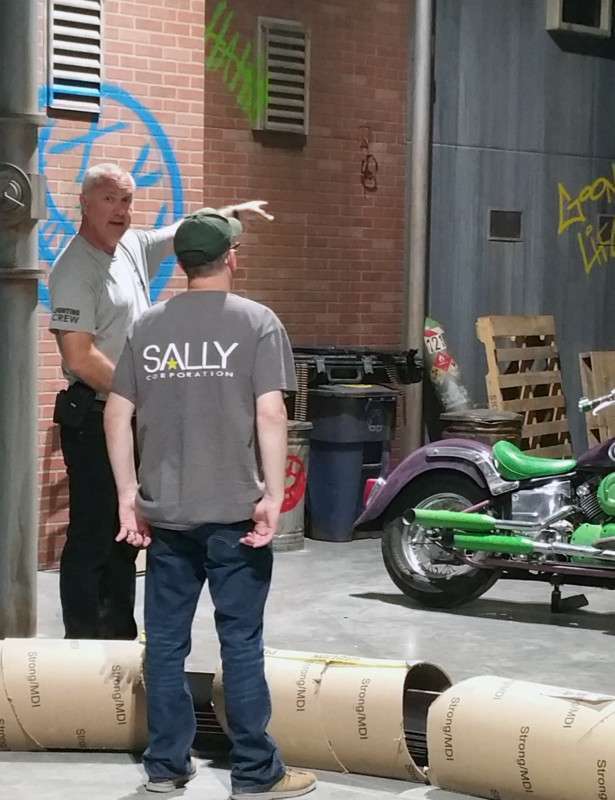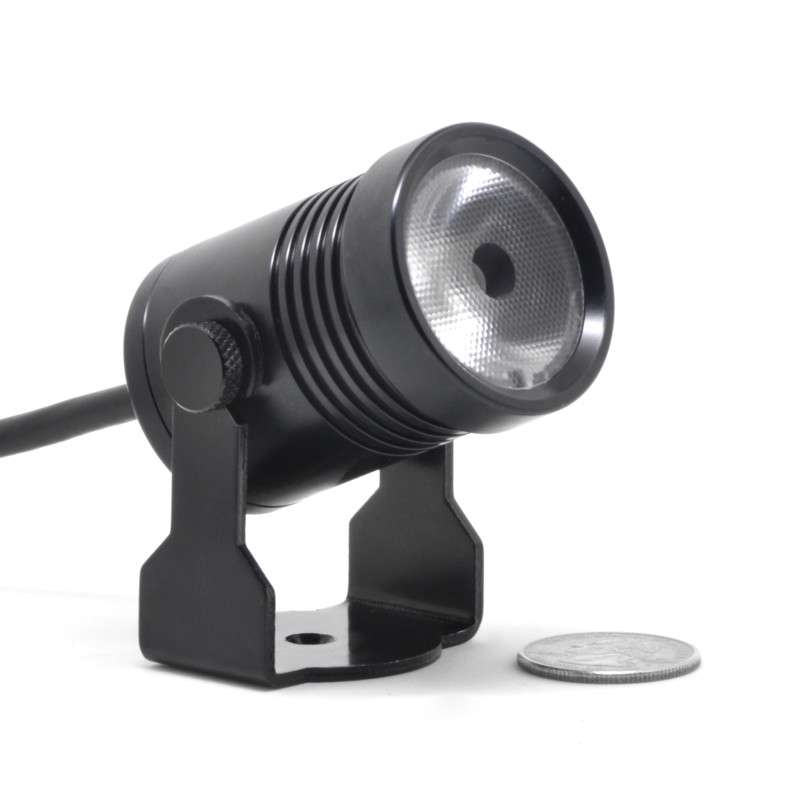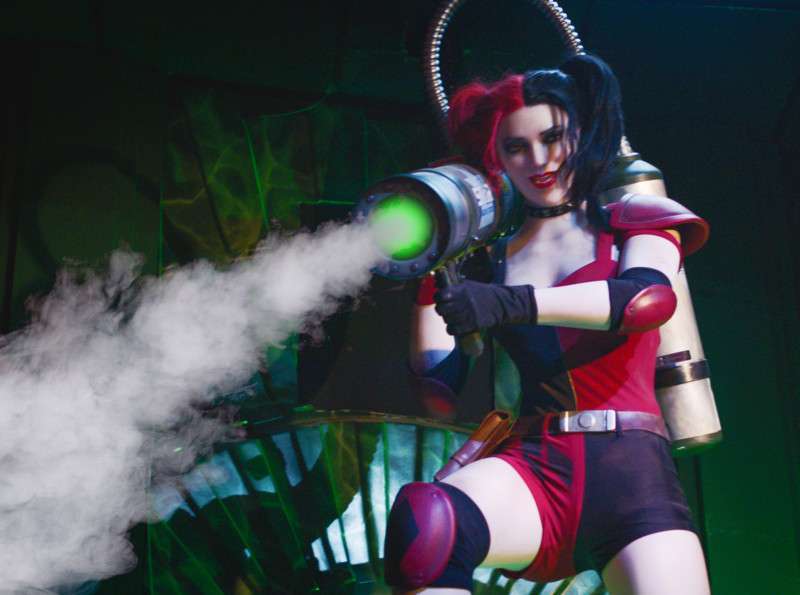Illuminating JUSTICE LEAGUE: Battle for Metropolis at Six Flags parks
by Judith Rubin and Mark Eades
ABOVE: The Joker fires “laughing gas” at riders on JUSTICE LEAGUE: Battle for Metropolis. Photo courtesy of Six Flags
Between 2015-2017, the interactive dark ride JUSTICE LEAGUE™: Battle for Metropolis opened in seven Six Flags locations: Arlington, TX; St. Louis, MO; Gurnee, IL; Jackson, NJ; Mexico City; Atlanta, GA; and Santa Clarita, CA (Six Flags Magic Mountain, in the greater Los Angeles area). In April 2019, the ride was honored with a TEA Thea Award for Outstanding Achievement that singled out the installation at Six Flags Magic Mountain.
“We wanted it to look as real as possible for a comic book world,” said Scott Sterner, Corporate Director Entertainment and Events, Six Flags Entertainment. That “look” was a new one Warner Bros. (which owns the rights in the US) and DC Comics rolled out for the characters and world of Justice League at the same time the ride was developed for Six Flags in the North American market.
To address the challenges of authentically delivering the Justice League IP in a great guest experience on a theme park dark ride platform, Six Flags collaborated with an external creative team led by Sally Corporation and headed by Sally creative director Rich Hill. This design, engineering and production team worked to uphold the brand while coordinating with interactive elements, 3D video, animatronic characters, set pieces and ride vehicles – to tell the story and maintain a seamless, immersive quality within the built-and-projected environment.

Leading the lighting design team for the attraction was Tony Hansen, head lighting designer and project/product specialist at Techni-Lux, an Orlando-based specialist that has provided service and equipment to numerous theme park projects and visitor attractions. Techni-Lux has been on Sally Corp’s team for all seven iterations of JUSTICE LEAGUE: Battle for Metropolis. There were lessons learned along the way, and each installation had its unique aspects, but Techni-Lux maintained a consistent approach to design and choice of equipment. The lighting installation packages specified by Hansen rely primarily on the ultra-compact LED fixtures manufactured by Los Angeles-based Gantom Lighting & Controls.
The seventh installation, at Six Flags Magic Mountain, was the largest and highest-profile, featuring the addition of the character of Harley Quinn. The location was a challenge for the team to top itself. As Sterner noted, “We’re right up the road from Disneyland, Knott’s Berry Farm and Universal Studios Hollywood.”
This approach to theatrical lighting within a visitor attraction is one component of an overall approach to creating competitive attractions on smaller budgets, within reach of regional operators. The trend, facilitated by strides in technology, empowers high levels of creativity within limited budgets and shows what an enterprising, external team can do to raise the bar for quality and guest experience no matter the location.
Philip Hernandez, CEO of Gantom was interviewed for this story, as were Tony Hansen and Alex Gonzalez (vice president) of Techni-Lux.
Meeting unique lighting challenges with LEDs
While striving to authentically evoke the DC Universe and help immerse guests into the attraction environments and story, the lighting team was also charged to strive for high quality and ease of maintenance, and to use LEDs throughout.
Guests pass through several pre-show spaces on their way to board vehicles equipped with shooters that are part of an interactive gaming system. They are plunged into a series of confrontations as they travel through the dystopian Gotham cityscape. The vehicles and interactive elements were provided, respectively, by Oceaneering and Alterface, two key team members on all installations. It was part of Hansen’s lighting design challenge to make scene authentic and evocative, and lit in such a way that guests feel continuity throughout the adventure whether interacting with something built or something projected.
In one busy street scene, for instance, guests face a panorama of characters and activity generated via video gaming engine. The bad guys are abducting some of the good guys and guests are called on to help shoot at the villains, who react in real time to being fired upon. The interactive gaming elements presented a unique lighting challenge. “Thanks to Alterface, we learned so much about the IR (infrared) of LED lights,” said Hansen. “LEDs have a unique IR signature that can trigger things in the gaming system. The gaming system provider and lighting system provider have to work hand in hand for scenes that use both.”
In another key scene, the guests’ vehicles have found their way into the Joker’s lair for a close-up, gas-laced confrontation under flickering lights; there, the characters, props and set pieces are physical characters and props. (The animatronic Joker in this scene, in signature greens and purples, has been an icon of the experience since the figure was first unveiled about five years ago on the IAAPA Orlando show floor).

Specializing in fixtures for low-light and space-constrained environments, all Gantom’s fixtures are small, LED based, IP65 rated, UL Listed, and low voltage. They range from 1-Watt, single-color LED fixtures to 7-Watt, 7-color DMX fixtures. Their average fixture life is listed at 50,000 hours. Philip Hernandez talked about quality and quality control. “LEDs are made in batches and graded like diamonds with a rating system called binning. Gantom chooses LEDs from the same bin for every fixture type. That way, the color is of an even quality and degrades at the same half-life,” he said. “A big benefit of colored LEDs is that designers don’t have to use gels, which fade over time, and the tasks of replacement and matching colors are simplified.”
Fixtures having the capability to interface with DMX dimmer controllers allow lighting designers to precisely set the level and colors for each fixture. The DMX interface also facilitates immersion and interactivity in being able to readily program the lights to change as visitors go through a room. In an IP-based attraction, this goes straight to brand consistency. The world of the experience needs to be authentic to the source material, to satisfy the fan base as well as the standards called out in the licensing contracts Six Flags holds from DC Comics and Warner Bros.
Hansen found the Gantom fixtures ideal for helping achieve a consistent look and feel in this multimedia setting. “Everything was built with lighting in mind, especially the queue,” he said. “We worked with Rich Hill and Bill Kivi, with the scenic fabricators and with other team members to help lay out all the queue line elements and placement, crawl spaces, and handpoints to figure out where to put lights, which were all hidden like architectural elements, mounted to pieces of wood. We would drill a hole, mount wood behind the hole, and attach the light to the wood to shine through the hole, like a recessed fixture. Now repeat that 300 times and multiply by three! (The Magic Mountain build overlapped with those in Georgia and New Jersey, requiring precise planning and quite a bit of travel.)
Setting the stage
According to Hansen, the lighting installation for Magic Mountain took approximately 500 labor hours, with nearly 90 percent of the ride lit by Gantom products – more than 300 fixtures within the queue and preshow spaces. The lights had to comply with California’s stringent building and safety codes, and are UL listed. “The LEDs that are part of Gantom’s Precision Z series are the ones I made the most use of. That line is available in a variety of colors and I can pick the ones I want, then mix the lights together to get any color,” said Hansen.

Each room/scene has a specific mood, supporting the progression of the story, in which things take an unexpected turn and guests are enlisted to help Justice League good guys (Cyborg, Superman, Batman, etc.) battle evil super-villains (Joker, Lex Luthor, etc., plus – in the Magic Mountain installation only – Harley Quinn). “The ride at Magic Mountain has an elaborate queue line, with three very distinct feels in three distinct rooms,” said Hansen.
The lighting helps create a gradual mood change as guests pass from one room to another, transitioning from the comforting, warm white light of the lobby (“except for the statues which are cool white so they really pop”) to the ominous, darker laboratory (“a big bold space, with columns and uplighting.”) The sense that something is about to go wrong is reinforced as the environment darkens with blues and a hint of red (“the angry colors”). By the time they arrive at dispatch to board vehicles and help save the city, the ridescape is stark and angular (“we broke it up with the use of gobos, and dark, forbidding colors”).
Per Hansen, some major benefits of Gantom fixtures are being easy to conceal, DMX programmable, low voltage, long-lived and powerful despite their small size. “The Gantom products are so small that I can place them in plain view without the riders noticing them,” Hansen said. “They’re about the size of a dime or a C-cell battery, yet they are powerful enough to light objects up to 25 feet away. They draw 12 volts DC, and we run them off transformers, connected to a standard 110 outlet. In most scenes, we were able to place the wiring in cable trays or in ceilings – making it easy to hide the wires.”
In addition to the main complement of Gantom lights, Techni-Lux used items from several other manufacturers for special touches, including several of its own proprietary, DMX controlled LED fixtures including “power rods” – a custom wand inside a tube, and “blinky boxes” – blinking arrays that create a sense of warning and urgency. Another Hansen signature is what he calls “liquid dimming” – the use of black spray paint to add a gritty mood and tint to the lights.
“Lighting Harley Quinn at Magic Mountain was its own special challenge,” said Hansen. “She is perched above us in a spot where it was difficult to get good lighting positions while keeping the lights well hidden. In these guest access areas, everything has to be hidden, bulletproof, solid,” said Hansen in another nod to the compact power and versatility of the Gantom fixtures. “The lights are hidden all around, literally in the woodwork. Harley is very green, but Joker’s weapon is also green, so they had to be two different greens. I tried to give her character a regal, royal look, and the weapon to be sillier.”
LEDs and themed entertainment
The first JUSTICE LEAGUE: Battle for Metropolis attraction in 2015 was Hansen’s first time lighting a theme park attraction with all LEDs, a goal he had cherished for some time. Today, he’s lit all seven this way, and other projects besides. “We’re doing LED stuff everywhere,” he said, citing new projects with Sally – the recently opened Sesame Street dark ride in Port Aventura (Spain) and soon-to-open Reese’s CupFusion at HersheyPark, both also using Gantom products. Other projects include lighting a Batman-themed waterslide collaboration with WhiteWater West (honored with a European Star Award) and a snow-tubing hill at a ski resort. “Some of what we’ve managed to dabble in is phenomenally unique,” said Hansen.
“Our company has deep technical understanding that allows us to be very flexible for the client and make the technology much easier for them to deal with,” said Alex Gonzalez. “We function as a design and support team, a theme park tech think tank. We have been doing this for 25 years in theme parks and 37 years overall design, and have great connections and resources. We bring knowledge and experience to the table.”

JUSTICE LEAGUE: Battle for Metropolis was our focus for this story, but the lighting trend it represents can be found around the world in numerous attractions. Permanent installations, such as another recent Thea Award recipient, the Basilisk dark ride at Legendia Park in Poland, can transform a park and bring new tourism to the region it serves. Popup attractions are also embracing the trend: Smallfoot Yeti Village, for instance, was a two-story, animated walkthrough that helped Warner Bros. build buzz for the “Smallfoot” movie premiere in summer 2018.
“As themed entertainment expands and its tools are applied to more market sectors and venues, people realize the value of it in their facility,” said Hernandez. “You can see the expansion in museums and restaurants and casinos moving in that direction, for example. The designers who do those projects tend to have roots in theater and/or themed entertainment.”
“It’s an exciting time for lighting designers and the attractions industry in general. There are so many great tools and technologies to play with, and so many types of projects and challenges,” said Hansen. “We congratulate Six Flags on the success of the Justice League attractions, and look forward to the next adventure.”
Genesis and acclaim
Prior to JUSTICE LEAGUE: Battle for Metropolis, there was Justice League: Alien Invasion 3D, which opened at Warner Bros. Movie World in Australia, in September 2012. Sally Corp. led development of the ride, and following its success, Sally CEO John Wood sought to bring the concept to more parks around the world.
Six Flags was a good fit as the regional chain had licensed the theme park rights to the DC Comics Universe in the US, with many thrill rides themed to DC Comics characters – and JUSTICE LEAGUE: Battle for Metropolis was born. The combination of real-time, 3D video gaming within a highly detailed immersive dark ride setting marked a new and successful direction for Six Flags.
In addition to attracting the patronage of theme park audiences, with the new Justice League attraction Six Flags has earned new acclaim and respect from within the industry. It was the Magic Mountain installation that earned the Thea Award, but in its official comments the TEA Thea Awards Committee took note of the development arc: “…with the JUSTICE LEAGUE™ attraction in seven parks since 2015, Six Flags and their team have achieved a commendable, constant trend of artistic and technical improvements and set an example for the industry.” • • •
For more information: www.gantom.com www.techni-lux.com






